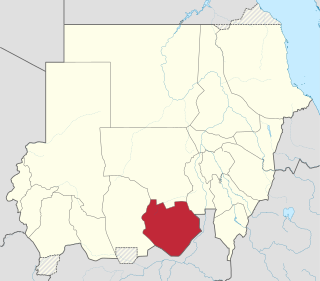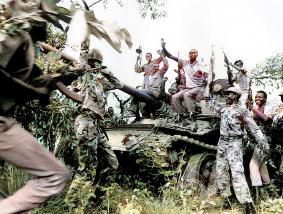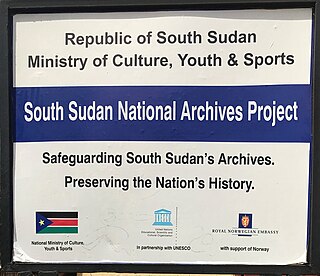Related Research Articles

Khartoum or Khartum is the capital of Sudan. With a population of 5,274,321, its metropolitan area is the largest in Sudan. It is located at the confluence of the White Nile, flowing north from Lake Victoria, and the Blue Nile, flowing west from Lake Tana in Ethiopia. The place where the two Niles meet is known as al-Mogran or al-Muqran. From there, the Nile continues north towards Egypt and the Mediterranean Sea.

Sudan, officially the Republic of the Sudan, also known as North Sudan colloquially, is a country in Northeast Africa. It is bordered with the Central African Republic to the southwest, Chad to the west, Egypt to the north, Eritrea to the northeast, Ethiopia to the southeast, Libya to the northwest, South Sudan to the south and the Red Sea. It has a population of 45.70 million people as of 2022 and occupies 1,886,068 square kilometres, making it Africa's third-largest country by area, and the third-largest by area in the Arab League. It was the largest country by area in Africa and the Arab League until the secession of South Sudan in 2011, since which both titles have been held by Algeria. Its capital city is Khartoum and its most populous city is Omdurman.

South Kordofan is one of the 18 wilayat or states of Sudan. It has an area of 158,355 km² and an estimated population of approximately 1,100,000 people (2000). Kaduqli is the capital of the state. It is centered on the Nuba Hills. At one time it was supposed that South Kordofan was the only state in (North) Sudan suitable for producing oil, but oil has also been discovered in neighboring White Nile State in larger quantities.

The Second Sudanese Civil War was a conflict from 1983 to 2005 between the central Sudanese government and the Sudan People's Liberation Army. It was largely a continuation of the First Sudanese Civil War of 1955 to 1972. Although it originated in southern Sudan, the civil war spread to the Nuba mountains and the Blue Nile. It lasted for 22 years and is one of the longest civil wars on record. The war resulted in the independence of South Sudan six years after the war ended.

Juba is the capital and largest city of South Sudan. The city is situated on the White Nile and also serves as the capital of the Central Equatoria State. It is the world's newest capital city to be elevated as such, and had a population of 525,953 in 2017. It has an area of 52 km2 (20 sq mi), with the metropolitan area covering 336 km2 (130 sq mi).

The War in Darfur, also nicknamed the Land Cruiser War, is a major armed conflict in the Darfur region of Sudan that began in February 2003 when the Sudan Liberation Movement (SLM) and the Justice and Equality Movement (JEM) rebel groups began fighting against the government of Sudan, which they accused of oppressing Darfur's non-Arab population. The government responded to attacks by carrying out a campaign of ethnic cleansing against Darfur's non-Arabs. This resulted in the death of hundreds of thousands of civilians and the indictment of Sudan's president, Omar al-Bashir, for genocide, war crimes, and crimes against humanity by the International Criminal Court.

The Abyei Area is an area of 10,546 km2 or 4,072 sq mi on the border between South Sudan and the Sudan that has been accorded "special administrative status" by the 2004 Protocol on the Resolution of the Abyei Conflict in the Comprehensive Peace Agreement (CPA) that ended the Second Sudanese Civil War. The capital of the Abyei Area is Abyei Town. Under the terms of the Abyei Protocol, the Abyei Area was considered, on an interim basis, to be simultaneously part of both the Republic of South Sudan and the Republic of the Sudan, effectively a condominium.

The South Sudan People's Defence Forces (SSPDF), formerly the Sudan People's Liberation Army (SPLA), is the army of the Republic of South Sudan. The SPLA was founded as a guerrilla movement against the government of Sudan in 1983 and was a key participant of the Second Sudanese Civil War, led by John Garang. After Garang's death in 2005, Salva Kiir was named the SPLA's new Commander-in-Chief. As of 2010, the SPLA was divided into divisions of 10,000–14,000 soldiers.

The States of South Sudan were created out of the three historic former provinces of Bahr el Ghazal (northwest), Equatoria (southern), and Greater Upper Nile (northeast). The states are further divided into 79 counties.

The foreign relations of South Sudan are the relations between the Republic of South Sudan and sovereign states and international organizations. The establishment of the relationships followed the formation of the South Sudanese state on 9 July 2011. South Sudan's former parent country Sudan became the first state in the world to recognize South Sudan.

South Sudan, officially the Republic of South Sudan, is a landlocked country in East Africa. It is bordered by Ethiopia, Sudan, Central African Republic, Democratic Republic of the Congo, Uganda and Kenya. Its population was estimated as 10,913,164 in 2022. Juba is the capital and largest city.

South Sudan is home to around 60 indigenous ethnic groups and 80 linguistic partitions among a 2021 population of around 11 million. Historically, most ethnic groups were lacking in formal Western political institutions, with land held by the community and elders acting as problem solvers and adjudicators. Today, most ethnic groups still embrace a cattle culture in which livestock is the main measure of wealth and used for bride wealth.
Christianity is the most widely professed religion in South Sudan, with significant minorities of the adherents of traditional African religions and Islam.

South Sudan is a multilingual country, with over 60 indigenous languages spoken. The official language of the country is English which was introduced in the region during the colonial era.

The Transitional National Legislative Assembly is the lower house of the Transitional National Legislature of South Sudan.

India–South Sudan relations are the bilateral ties between the Republic of India and the Republic of South Sudan. India recognised South Sudan on 9 July 2011, the day South Sudan became an independent state. India maintains an embassy at Juba, and South Sudan maintains an embassy in New Delhi.

The South Sudanese passport is given to citizens of South Sudan for international travel. The Republic of South Sudan started issuing internationally recognised electronic passports in January 2012. The passports were officially launched by President Salva Kiir Mayardit on 3 January 2012 at a ceremony in the capital city of Juba. The new passport will be valid for five years.

The South Sudanese Civil War was a multi-sided civil war in South Sudan between forces of the government and opposition forces. In December 2013, President Kiir accused his former deputy Riek Machar and ten others of attempting a coup d'état. Machar denied trying to start a coup and fled to lead the SPLM – in opposition (SPLM-IO). Fighting broke out between the Sudan People's Liberation Movement (SPLM) and SPLM-IO, igniting the civil war. Ugandan troops were deployed to fight alongside the South Sudanese government. The United Nations has peacekeepers in the country as part of the United Nations Mission in South Sudan (UNMISS).

South Sudanese nationality law is regulated by the Constitution of South Sudan, as amended; the South Sudanese Nationality Act and Nationality Regulations, and their revisions; and various international agreements to which the country is a signatory. These laws determine who is, or is eligible to be, a national of South Sudan. The legal means to acquire nationality, formal legal membership in a nation, differ from the domestic relationship of rights and obligations between a national and the nation, known as citizenship. Nationality describes the relationship of an individual to the state under international law, whereas citizenship is the domestic relationship of an individual within the nation. In South Sudan, nationality is often equated with ethnicity, despite recognition of the legal definitions. South Sudanese nationality is typically obtained under the principle of jus soli, i.e. by birth in South Sudan, or jus sanguinis, born to parents with South Sudanese ancestry. It can be granted to persons with an affiliation to the country, or to a permanent resident who has lived in the country for a given period of time through naturalization.

The COVID-19 pandemic in South Sudan is part of the ongoing worldwide pandemic of coronavirus disease 2019 caused by severe acute respiratory syndrome coronavirus 2. The virus was confirmed to have reached South Sudan on 5 April 2020. The first four confirmed cases were all UN workers.
References
- ↑ "Acts Supplement No. 1: Act 9" (PDF). The Southern Sudan Gazette. Ministry Legal Affairs and Constitutional Development, Government of South Sudan. 1 (1). Section 220. February 10, 2009. Archived from the original (PDF) on November 18, 2012.